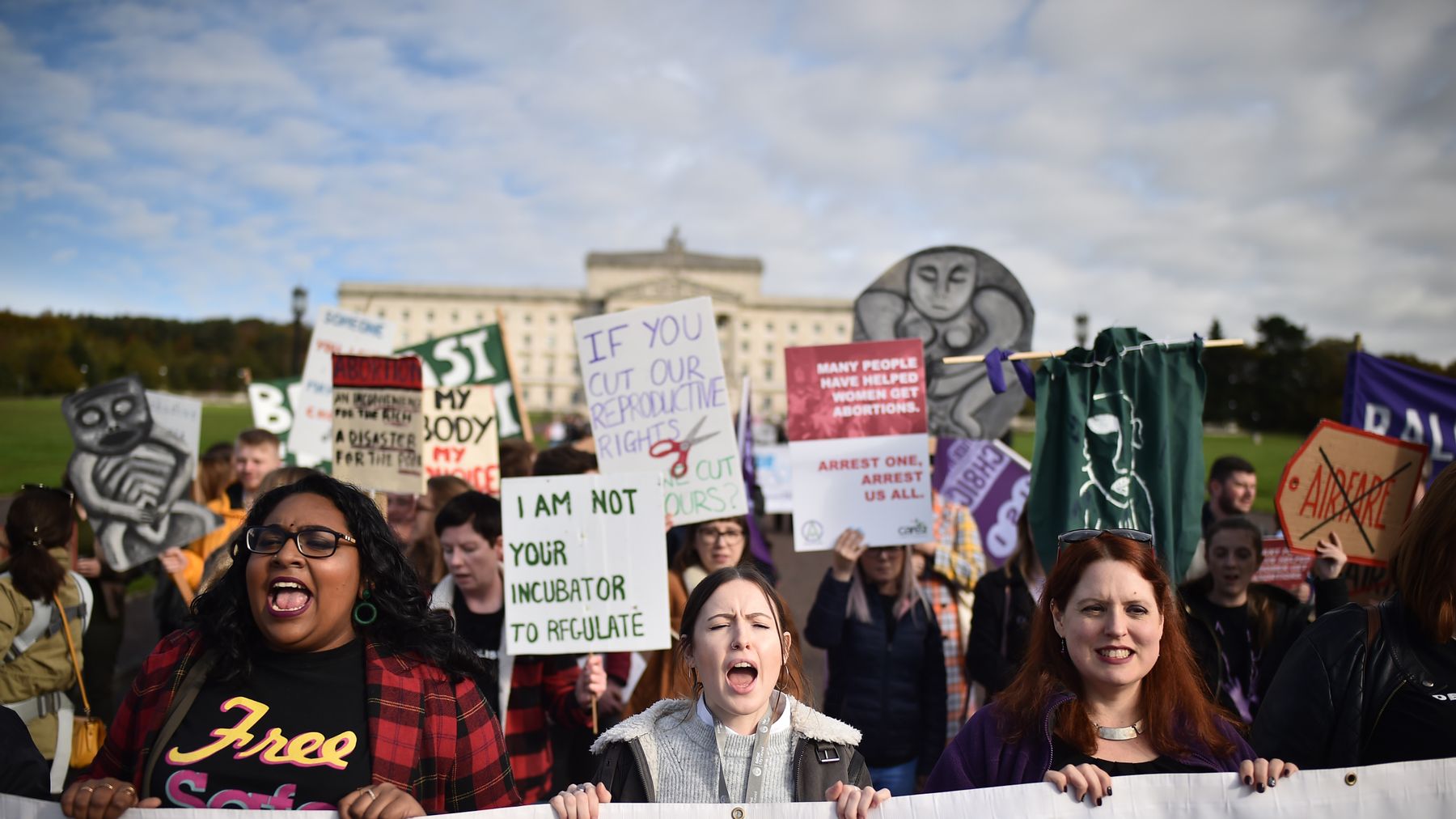On 16th November 2017, I photographed a pro-life protest outside the University of Leeds led by Abort67, an organisation fighting for the reversal of the 1967 Abortion Act in England, Scotland and Wales. Opposition protestors arrived at the scene with Irish flags, in support of abolishing anti-abortion laws in Northern Ireland.
Pro-choice campaigner Helen Crickard gave her views on the fact Northern Ireland had still got these laws in place: “This is the fault of our politicians who have completely failed to protect women in Northern Ireland by denying them the right to the same healthcare women in the rest of the UK can access.”

Fast forward two years, and this law has been abolished. With abortion decriminalised through the passing of the Northern Ireland Executive Formation Act, it marks a historic moment for the country, “throwing off the shackles of the Catholic church” as expressed by pro-choice supporter Sarah McCormack. Until now, abortion has been illegal unless there was risk to a woman’s life or risk of permanent and serious damage to her health.
It is estimated that around seven hundred women travel from Northern Ireland to other areas of the UK for abortions every year, so this change has been long anticipated for so many. In further a historic change due to the passing of the act, same-sex marriage has also been legalised, with the first same-sex weddings reportedly set to take place in February 2020.
This has, of course, had a great impact on the country’s politics. The changes appear to be causing larger divisions between various communities, and the progressive steps for the country seem to be causing something of a negative atmosphere.
In July, British lawmakers authorised the decriminalisation of abortion and the creation of lawful access to abortion services, alongside rolling out new regulations to allow same-sex marriage and civil partnerships. They gave Northern Ireland’s assembly until October 21st to institute alternations to the reforms after being suspended since January 2017.
This didn’t happen, despite final efforts by some of the region’s socially conservative politicians and anti-abortion groups, led by the Democratic Unionist Party (DUP) who briefly restored the assembly on the 21st at Stormont. Thirty-one members of the legislative assembly (MLAs) signed a petition to force a recall to discuss a motion to put abortion rights back into the hands of local politicians. However, without support from opposition Sinn Fein and Alliance parties, they were devoid of power, unable to constitute an executive, and therefore unable to pass any changes.
Northern Ireland had retained the historic 19th century ban on same-sex marriage and a ban on abortion due to the power of the DUP and other social and religious conservatives.
Sinn Fein vice-president Michelle O’Neill called the DUP-led reconvening of the assembly a political “stunt”, achieving “nothing other than to bring the political institutions into further disrepute and further undermine public confidence”.
“It is not lost on the public that the first time the DUP recalled the assembly was yet another attempt to deny a section of our community rights,” she added, welcoming the reforms.
Outside Stormont protestors gathered, some backing the MLAs in their bid to avert the change, others condemning it. Bernadette Smyth, director of pro-life organisation ‘Precious Life Northern Ireland’, called the new law “undemocratic” and “wrong”.

“It’s important that we’re here today to be a voice for the vulnerable – unborn children in our society”, she stated. Opposing views came from Danielle Roberts, an activist with Alliance for Choice, who argued that “human rights have always been the responsibility of Westminster” and that “finally, they’ve actually done their duty.”
Amnesty International’s Northern Ireland campaign manager, Grainne Teggart, was amongst those celebrating the news, stating that, “At midnight history will be made.” She went on to say that, “it marks the end of inequality both for same sex couples who have long wanted to marry the person they love, and also for women who have been suffering at the hands of our abortion ban.”
Many also celebrated the legislation for same-sex marriage, with some counting down the hours in anticipation. Anthony Flynn, a Green party councillor said “I was incredibly cynical and sceptical of it passing right up until the last moment because we’ve been pushed back so many times.”
The Rev Chris Hudson, minister of All Souls Church, Belfast also showed his support for the legislation. “To decide that you will lock couples of faith out of a process that is on offer to heterosexual couples, which is faith marriage, to me seems to be – and I don’t like using this word – but it is discriminatory.”
However, many took the change in legislation negatively. DUP leader, Arlene Foster, labelled it “a very sad day” and said her party would continue to use “every possible legal option” to repeal the legislation passed.
“I know some people will seek to celebrate today and I would say to those people: ‘Think of those of us who are sad today and who believe that this is an affront to human dignity and to human life.’”
TUV leader Jim Allister said: “Until this moment, until this day in Northern Ireland, the safest place for an unborn child was in the sanctuary of its mother’s womb. Sadly (now) the most dangerous place for some unborn will be in the mother’s womb because the wanton decision can be taken to kill them”.
It is clear to see that while these historical legislative changes have been passed, there is still a battle for many. With so many communities and political organisations opposing the changes and doing their upmost to repeal them, the people of Northern Ireland are still unable to feel completely comfortable in the knowledge that they now have more freedom, choice and inclusion because of those still choosing to seclude them.
Image: Getty

